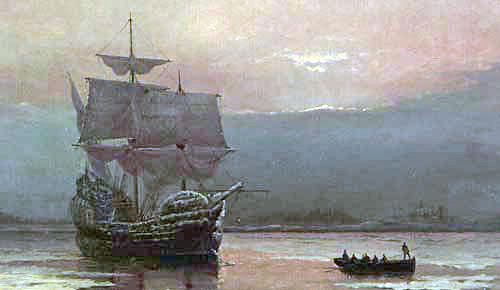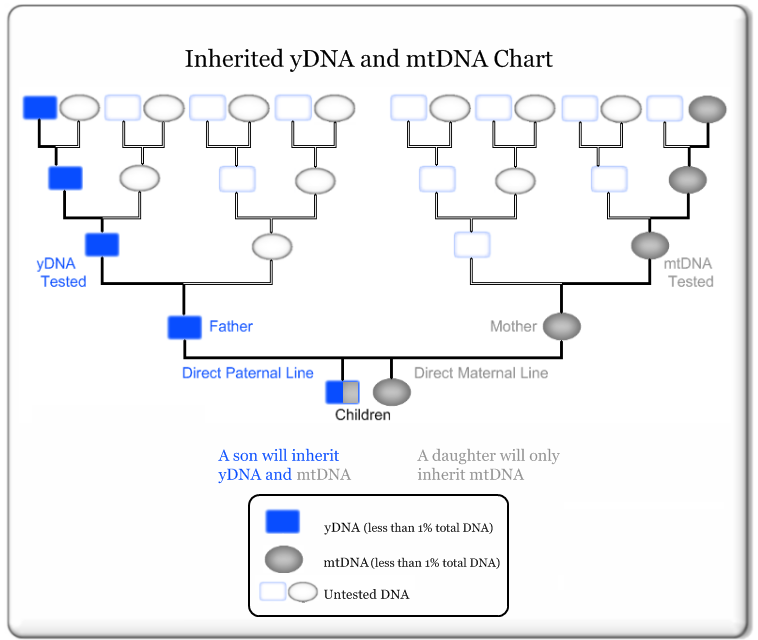Mayflower DNA Project
Contents
IMPORTANT: Read First
This wiki traces the Y-DNA and mtDNA of Mayflower passengers, their spouses, and the spouses of their children and grandchildren. It does NOT work with autosomal DNA tests (such as AncestryDNA, 23andMe, etc.). Because we inherit autosomal DNA from both of our parents (who in turn inherited their DNA from both of their parents, etc.) the amount of autosomal DNA we inherit from each of our ancestors decreases every generation. After about 5-6 generations we no longer inherit any autosomal DNA from some of our ancestors. Almost all living Mayflower descendants are at least 10 generations removed from our Mayflower ancestor. That far back, we only inherit DNA from a tiny fraction (much less than 1%) of our ancestors from that generation. Even if we are lucky enough to have inherited autosomal DNA from a Mayflower ancestor, there really is no way to document which ancestors from that generation we inherited any of our DNA from.
The vast majority of descendants of Mayflower Passengers will NOT have inherited their Y-DNA or mtDNA from a family in this project. Only males have the Y sex chromosome and they inherit this chromosome solely from their father, who inherited it from his father, etc. Thus, the Y-DNA follows the Patrilineal (not Paternal) line (father's father's father's father's etc.). While everyone has mtDNA, we inherit this DNA solely froum our mothers, who inherited her mtDNA solely from her mother. Thus, the mtDNA follow the Matrilineal (not Maternal) line (mother's mother's mother's mother's etc.)
Project dashboard
- About the project
- Y-DNA and mtDNA Primer
- How you can help
- DNA sample collection tips
- Participant consent
- Results:
- Testing Options:
Methodology
The focus of this project is on using advanced Y-DNA and mtDNA tests to document the patrilineal (all male line) and matrilineal (all female line) lineages from the Mayflower. For each surviving lineage from the Mayflower, this will provide the most comprehensive Y-DNA and mtDNA profile that is possible with current commercial genetic testing technology. When available, we will make use of prior genetic genealogy research related to these lineages (e.g. Y-STR test results) to provide supporting evidence and to guide project recruitment.
Through this approach, we aim to achieve the following objectives:
- Place the Mayflower passengers and crew into the broader human Y chromosome tree by determining high-resolution haplogroups for individual paternal lineages
- this can help provide a demographic-level picture of the ancestral origins of the groups comprising the 1620 Mayflower voyage
- these efforts will also likely aid in more general research of the human Y tree
- Identify unique, stable genetic markers for individual paternal lineages
- in some cases, it may be possible to identify one or two markers that confirm patrilineal descent from a single individual from the Mayflower
- Use the results to aid in genealogical research associated with the Mayflower passengers and crew, including tracing ancestry further back within England, Holland, etc.
- testing related lineages that stayed in Europe can be particularly helpful here
Contact us
Project administrators may currently be reached at MayflowerDNA1620@gmail.com .
References and External links
- Roser, Susan E., Mayflower Passenger References: from contemporary records and scholarly journals Stewart Publishing, Canada Second edition 2015
- Anderson, Robert Charles, The Mayflower Migration: Immigrants to Plymouth, 1620 New England Historic Genealogical Society, Boston, MA 2020
- Caleb Johnson's MayflowerHistory.com and Mayflower Passenger list
- Mayflower 400 Passenger List: an interactive guide
- American Ancestors 2020 Mayflower Passengers and Crew
- wikipedia List of Mayflower passengers
- International Society of Genetic Genealogy wiki
- General Society of Mayflower Descendants
- Guide to the Silver Books
- "Mayflower" article on Wikipedia
- Family Tree DNA (FTDNA) & General Society of Mayflower Descendants Mayflower DNA Project
- Y-SEQ Mayflower Group
- Geni.com Mayflower Passengers
© 2015-2023 mayflowerdna.org All Rights Reserved

